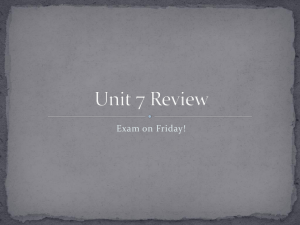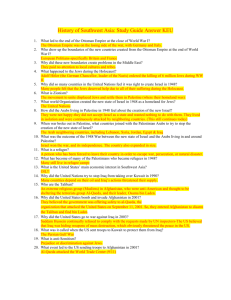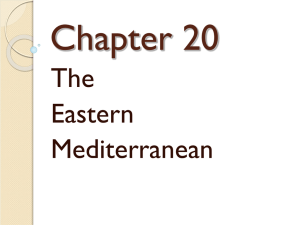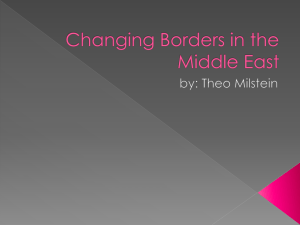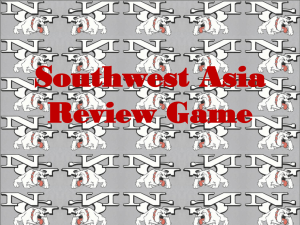Middle East Religions & History Study Guide
advertisement
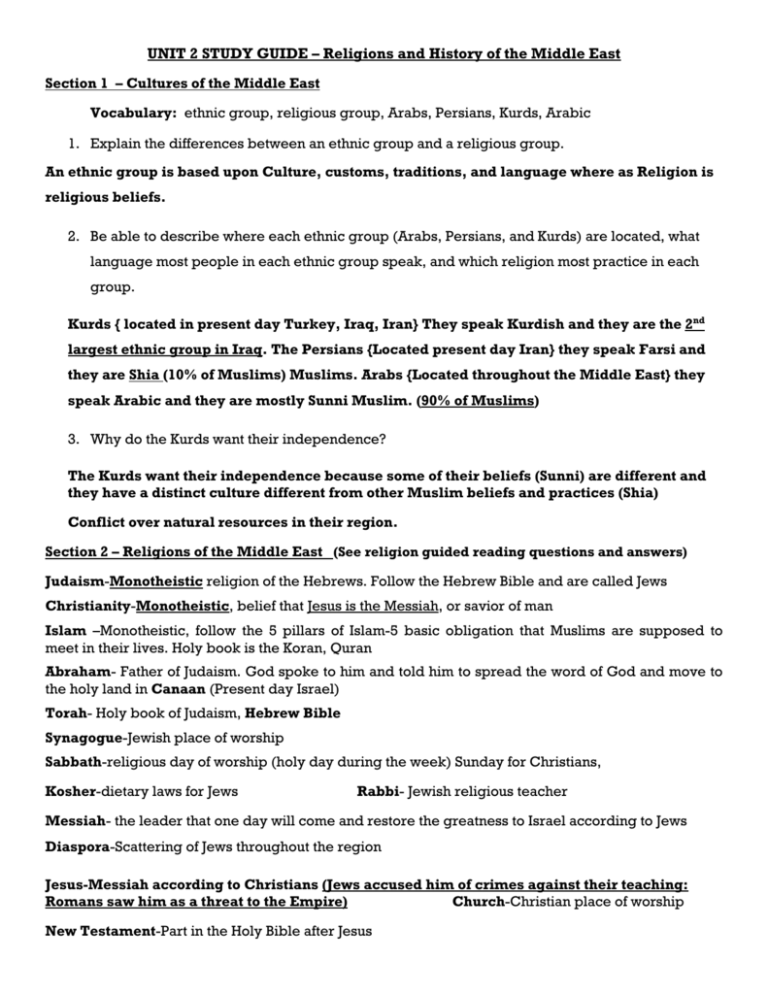
UNIT 2 STUDY GUIDE – Religions and History of the Middle East
Section 1 – Cultures of the Middle East
Vocabulary: ethnic group, religious group, Arabs, Persians, Kurds, Arabic
1. Explain the differences between an ethnic group and a religious group.
An ethnic group is based upon Culture, customs, traditions, and language where as Religion is
religious beliefs.
2. Be able to describe where each ethnic group (Arabs, Persians, and Kurds) are located, what
language most people in each ethnic group speak, and which religion most practice in each
group.
Kurds { located in present day Turkey, Iraq, Iran} They speak Kurdish and they are the 2nd
largest ethnic group in Iraq. The Persians {Located present day Iran} they speak Farsi and
they are Shia (10% of Muslims) Muslims. Arabs {Located throughout the Middle East} they
speak Arabic and they are mostly Sunni Muslim. (90% of Muslims)
3. Why do the Kurds want their independence?
The Kurds want their independence because some of their beliefs (Sunni) are different and
they have a distinct culture different from other Muslim beliefs and practices (Shia)
Conflict over natural resources in their region.
Section 2 – Religions of the Middle East (See religion guided reading questions and answers)
Judaism-Monotheistic religion of the Hebrews. Follow the Hebrew Bible and are called Jews
Christianity-Monotheistic, belief that Jesus is the Messiah, or savior of man
Islam –Monotheistic, follow the 5 pillars of Islam-5 basic obligation that Muslims are supposed to
meet in their lives. Holy book is the Koran, Quran
Abraham- Father of Judaism. God spoke to him and told him to spread the word of God and move to
the holy land in Canaan (Present day Israel)
Torah- Holy book of Judaism, Hebrew Bible
Synagogue-Jewish place of worship
Sabbath-religious day of worship (holy day during the week) Sunday for Christians,
Kosher-dietary laws for Jews
Rabbi- Jewish religious teacher
Messiah- the leader that one day will come and restore the greatness to Israel according to Jews
Diaspora-Scattering of Jews throughout the region
Jesus-Messiah according to Christians (Jews accused him of crimes against their teaching:
Romans saw him as a threat to the Empire)
Church-Christian place of worship
New Testament-Part in the Holy Bible after Jesus
Muhammad- Prophet/Leader of Islam and lived and taught in Mecca
Mecca-Place where all Muslims must travel to during Hajj once in their lifetime.
Allah-God in Islam
Five Pillars of Islam-Saying there is no God but Allah, Pray 5 times a day, fasting during the
holy month of Ramadan, giving to the poor, Hajj-travel to Mecca once in their lifetime.
Mosque-Islamic place of worship
Hebrews-lived in Canaan and started Judaism
Section 3 – History
Ottoman Empire-Largest Muslim Empire (Located in present day Middle East, Northern
Africa, and Eastern Europe,
Partition-European Powers divided up the Ottoman Empire after WW I,
Holocaust-Mass murder of over 6 million Jews during WW II,
Anti-Semitism-Extreme hatred of Jews
Zionism-Jewish movement to create a homeland (country) in Canaan (Zion) present day Israel.
Taliban-Group that controlled Afghanistan and protected the terrorist organization of AlQaeda
Al-Qaeda-Terrorist organization led by Osama bin Laden that was responsible for the 9-11
attacks
Constantinople- capital of the Ottoman Empire (present day Istanbul)
Refugee-person that seeks safety in another country because of war, famine, and natural
disasters
Palestine- land that is present day Israel and territories are continuously disputed with Israeli’s
Gaza Strip, Golan Heights, West Bank- Palestinian Territories
Invasion of Afghanistan/Operation Enduring Freedom (2001)- Was a direct response to
9/11 in which the U.S attacked Afghanistan to take out Al Qaeda, Osama bin Laden, and the
Taliban
Persian Gulf War/Operation Desert Storm-U.S attacked Iraq because they invaded Kuwait in
1991 with the support of the U.N (U.S involvement in the M.E causes Arab nations to dislike the
U.S) Iraq’s invasion of Kuwait threatened the oil supply in the region.
Operation Iraqi Freedom -U.S attacked Iraq because the U.S believed that they had Weapons of
Mass Destruction (WMD’s) 2003 They did not discover WMD’s but continued their mission to take
out Saddam Hussein and to set up a democracy.
OPEC-Organization of Petroleum Exporting Countries (purpose is to control the supply of oil and
as a result regulates the price of oil around the world.
ISIS (Islamic State of Iraq and Syria)-Is a terrorist organization that has control over parts of Iraq
and Syria in which the U.S is currently bombing. Their desire is to create an Islamic State.
Hamas- Terrorist group that controls the Gaza Strip and has been at war with Israel this year
1. What was the religion of the Ottoman Empire? Where was the Ottoman Empire located?
Muslim (Islam) religion and located in Turkey and what was once the Roman Empire.
2. Who drew the boundaries (partition) of the countries after the Ottoman Empire ended?
European politicians
3. Why was Israel established? When was it established? Who established it?
Israel was established as a homeland for the Jewish people in 1948 by the United Nations
because of their persecution/mistreatment during the Holocaust and Anti-Semitism in Europe
4. Who ruled Palestine just before Israel gained its independence?
United Nations controlled Palestine from after WW I until the creation of Israel in 1948
5. What occurred the day after Israel declared their independence?
There was an Arab- Israeli war. Israel won and it was even larger than originally planned
6. How does religion contribute to the conflicts in the region?
Judaism, Christianity, and Islam all began in the region. Different beliefs, names of Gods.
7. What country did the US send troops help free in 1990-91? What country did the US invade in
response to the 9-11 attack?
US sent troops to Kuwait in 1990-1991 (we had military bases in Saudi Arabia to attack Iraq)
Arab nations did not like the U.S involvement in the Middle East
Islamist resentment (anger) towards the U.S comes from the U.S using Saudi Arabia as
a base for invading Kuwait and attacking Iraq.
8. How did the establishment of Israel affect the people living there? Arab/Israeli Conflict
The Palestinians were forced to leave. (Wars 6 Day War, Israel gained land/Sinai
Peninsula) Disagreements over who should control the land as well as religious
differences.
9. How did European partitioning of the region at the collapse of the Ottoman Empire lead to conflict
in the region?
Because the Palestinians did not agree with the partitioning. (British control of Palestine)
10. Why did the US become involved in Afghanistan? What has happened? Why are we still there?
The US believes that they are hiding members of the Al-Qaida Group (Those responsible
for the 9-11 terrorist attacks against the United States). The U.S. are still there in search of
justice for the 9-11 catastrophe.
Long Answer Questions – Be ready to answer each question in at least 5 sentences. Make
sure you answer all parts!
Essays – write a minimum of 4 sentences for each essay!
1. Explain the differences between Sunni and Shi'a Muslims. Which group has a larger
following? Where are the groups located in the Middle East?
Shi’a believe that the leader must be a blood relative of Muhammad and Sunnis
do not. Sunni is a larger group (90%) Shia (10%). Shia are more fundamental
and Sunni more conservative. Shia live in Iran and Iraq and Sunni mostly live
in other parts of the Middle East.
2. Explain the historical reasons for the establishment of Israel in 1948. Include the
Jewish religious connections to the land, Holocaust, Anti-Semitism, and Zionism in
your answer.
In addition to all the hints above don’t forget Abraham’s promise from God
about Caanan, The Balfour Declaration, Zionism, etc.
3. What are the similarities and differences of the main religions of the Middle East?
Include at least three similarities between all three religions, and three ways each
religion is different from the other two in your response.
See religion chart we created in your notes…
4. Explain US presence and interest in the Persian Gulf War of 1990-91 and the invasion
of Iraq in 2003. Include in your essay why each war started, what was the US role in
the war, and what was the outcome or the current situation.
Our interest in the Persian Gulf War was to protect Kuwait and the U.S. interest
in oil. And the Iraq war of “2003” was because of WMD’s (Weapons of Mass
Destruction) and to capture Saddam Hussein and establish a new form of
Government.
